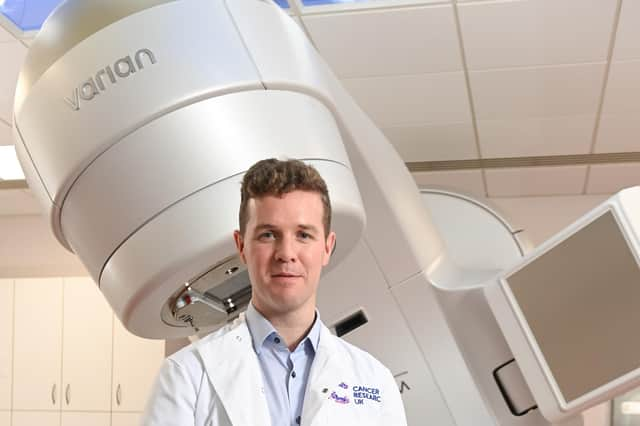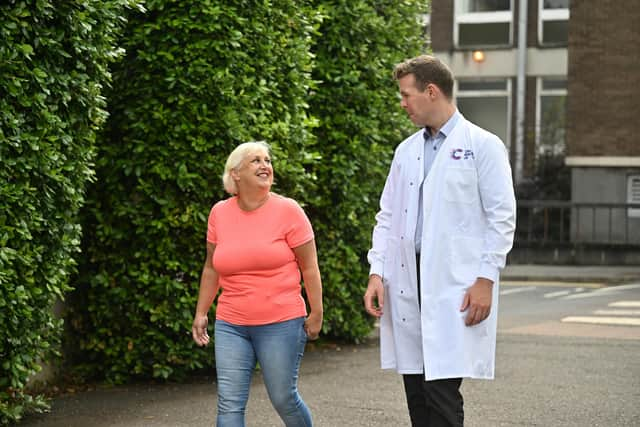NI doctor Gerard Walls is researching how to help protect cancer patients' hearts during radiotherapy treatment


Dr Gerard Walls, 34, from Magherafelt received the grant from Cancer Research UK and will look into whether medicines regularly used for cardiac treatment could maintain a healthy heart for some people undergoing cancer treatment.
“Cancer Research UK (CRUK) has been a key player in the development of radiotherapy over the years, which approximately half of patients receive during their cancer journey,” said Dr Walls.
Advertisement
Hide AdAdvertisement
Hide Ad“For example, trials CRUK has helped fund include many that have re-shaped how breast cancer can be treated more effectively. Breast cancer is actually another area where the heart has been highlighted as an important issue, and over the last decade, by taking special measures at the time of the radiotherapy planning scan as standard breast cancer has been made safer for the heart."


Dr Walls, who went to St Mary's Grammar School in Magherafelt, and studied Medicine at Queen’s University Belfast, currently works jointly between the Northern Ireland Cancer Centre and the Patrick G Johnston Centre for Cancer Research, Queen’s University Belfast.
He first became interested in research when he had the opportunity to help with a clinical trial as a medical student. He worked in London for two years, including at the Royal Marsden Hospital, before taking up his current position in Belfast. In addition to his own research, Dr Walls is also co-investigator in a CRUK-funded clinical trial, (CORNCORDE) investigating if giving targeted cancer drugs alongside radiotherapy can improve treatment outcomes for people with lung cancer.
Commenting on his current research, he said: “Preliminary results are encouraging, showing that we may be able to use a heart medicine to help keep our patients’ hearts safe during radiotherapy to the chest.
Advertisement
Hide AdAdvertisement
Hide Ad“I am delighted to have received this funding from Cancer Research UK, which means we will be able to do further testing of this medicine, and ultimately find out if this is a treatment we should give to patients with lung cancer.”
He explained that radiotherapy is the “gold standard treatment” for lung cancer for around 12,000 cancer patients across the UK, as most are unable to have an operation as they are too unwell, or a tumour is too difficult to access.
“There is a small risk that when the cancer is near to the heart, radiotherapy can cause some damage for some patients, even with the really accurate treatment that we have available at both cancer centres in Northern Ireland,” he said.
“There is currently a lack of options for protecting the heart, but this research might lead to a new useful, safe and cost-effective option. If we confirm the treatment to be useful, we will proceed to research in patients.
Advertisement
Hide AdAdvertisement
Hide Ad“Ultimately, we hope to improve the cardiac health of patients with lung cancer and this could also help patients with other types of tumours inside the chest too, such as oesophageal cancer.”
Cancer survivor Andrea Graham (58) from Bangor, is only too aware of the immeasurable value that comes with access to life-saving treatment and research, such as that being carried out by Dr Walls, having been diagnosed with cardiac problems, after her own cancer treatment.
Andrea was diagnosed with breast cancer in 2005, after finding a lump under her arm. Further investigations found that 16 lymph nodes were also affected, so a mastectomy, chemotherapy and radiotherapy followed.
“In view of the large number of cancer cases within the family, doctors decided to carry out some tests, which led to the discovery that the BRCA1 gene was present,” said Andrea. “ We were offered testing and this revealed that the rogue gene was carried by both male and female family members.”
Advertisement
Hide AdAdvertisement
Hide AdA BRCA gene fault does not mean a person has cancer, or that they will definitely get cancer, but it does mean a greater risk of developing several cancers, such as breast and ovarian cancer for women, and for men, prostate cancer.
Five years on from her first diagnosis, in 2010, Andrea was devastated to find the cancer had returned. Feeling she could not face it all again, she decided to stop all treatment . Thankfully a fellow cancer survivor and good friend ("chemo buddies” they called themselves) persuaded her to carry on .
Her decision to do so led to another mastectomy and surgery to remove her ovaries, followed by more chemotherapy. “Had I known about the BRCA gene when I was first diagnosed, I could have had a double mastectomy and ovaries removed at the same time,” said Andrea. “It just shows the rapid progress research is making.” Thankfully Andrea has now been cancer-free for 14 years.
She is very supportive of Dr Walls’ work having experienced heart trouble a few years ago, which she was told may have been due to her several intensive cancer treatments. Her cardiac diagnosis is now thankfully well managed with medication and she is now enjoying life.
“I definitely would have accepted a protective tablet for my heart during my treatment if Dr Walls’ current research had been ongoing in 2005–2010,” she added.
Visit www.cancerresearchuk.org.